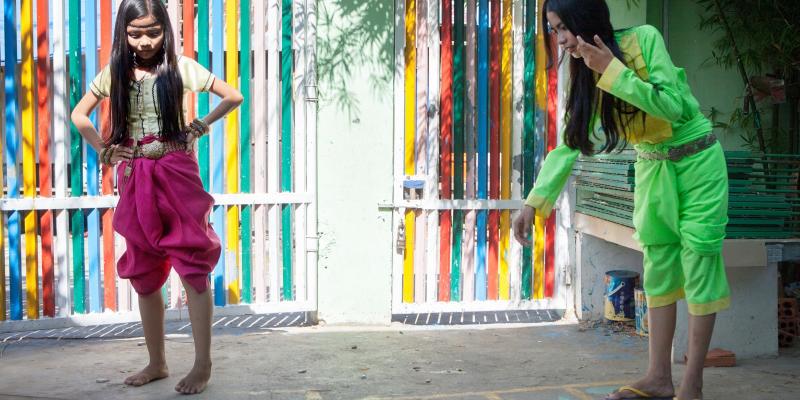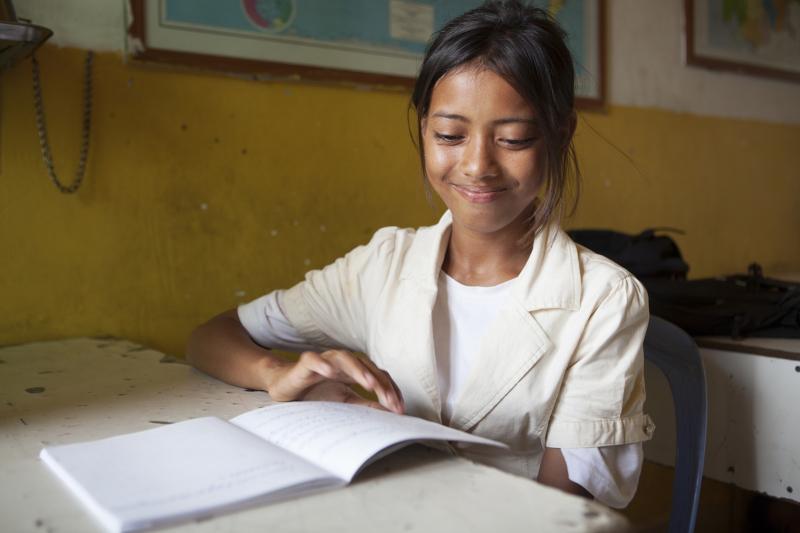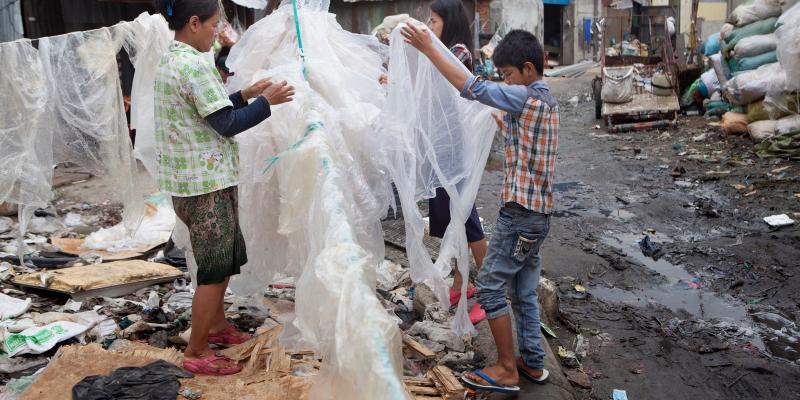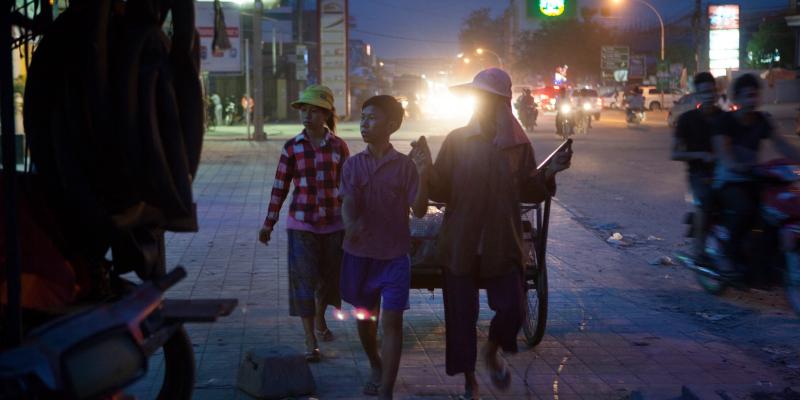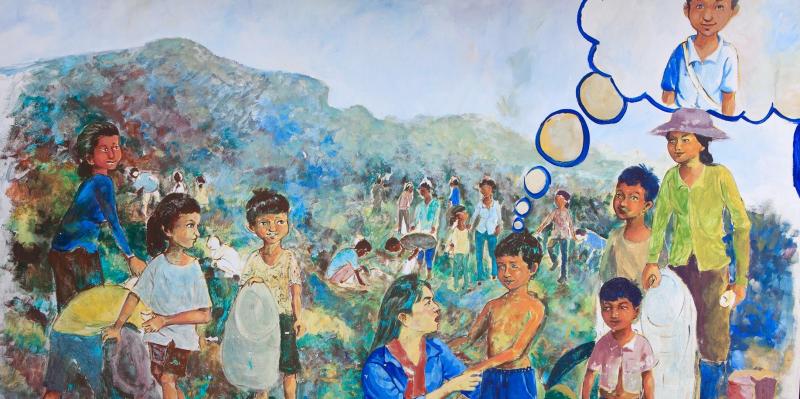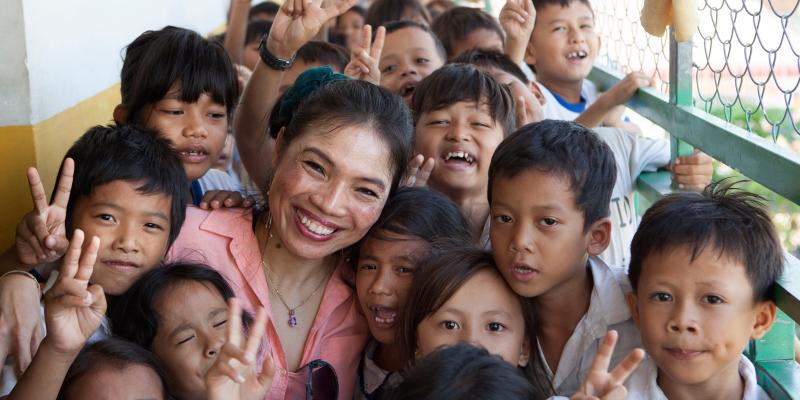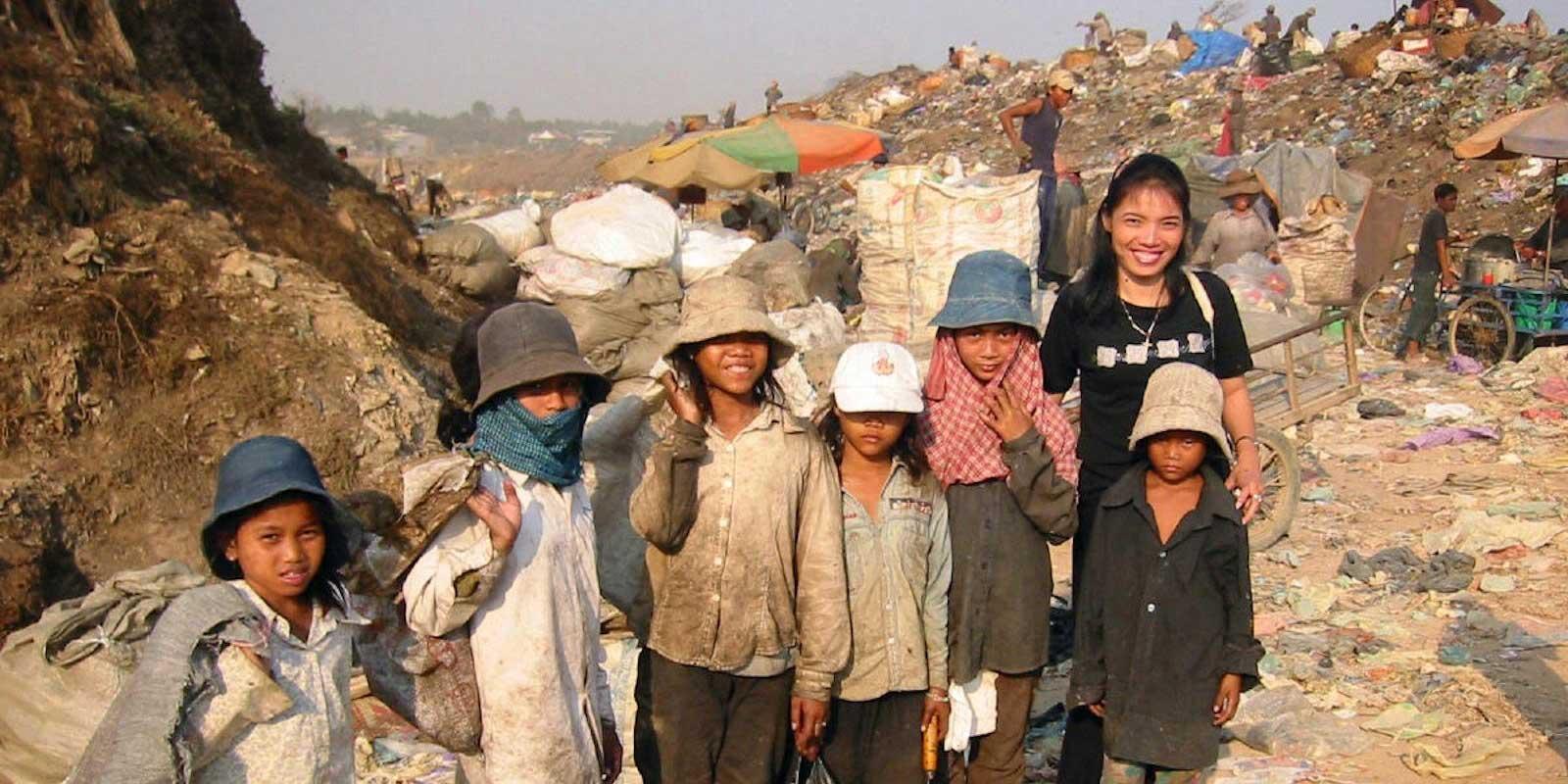
The stench of garbage makes Phymean feel sick the first time she visits the children on the garbage dump in Cambodia’s capital city, Phnom Penh. They don’t have shoes or clean water, and they live under canvas among the mud and trash. But although the children have nothing, the thing they want most of all is education.
Phymean knows exactly how the children on the garbage dump feel. When her mother Malis died, Phymean promised her that she would keep up the fight. She was 15 years old, and she was fighting to get herself an education and to feed herself and her little niece Malyda.
Phymean remembers every day of hard work and fear. So the first time she meets the children on the garbage dump, she goes straight back into town and quits her office job.
“As long as children live among trash, I cannot sit back and do nothing. Nobody ever helped me, but now I want to help them.”
Out of the city
Phymean’s story begins in April 1975, when she is four years old. Soldiers in black uniforms appear in town. They wave their weapons and say that everyone has to leave the town.
“Only for three days,” they say, “and then you can all come home again.” Phymean’s mother and father don’t pack anything, just some food and a motorized bike.
The roads are so full that it’s hard to get anywhere. The soldiers drive them out, further and further away. Something isn’t right.
They hear gunshots in the a distance. Anyone who tries to turn back is being shot.
The soldiers have tricked them. They are not going to be allowed to return home.
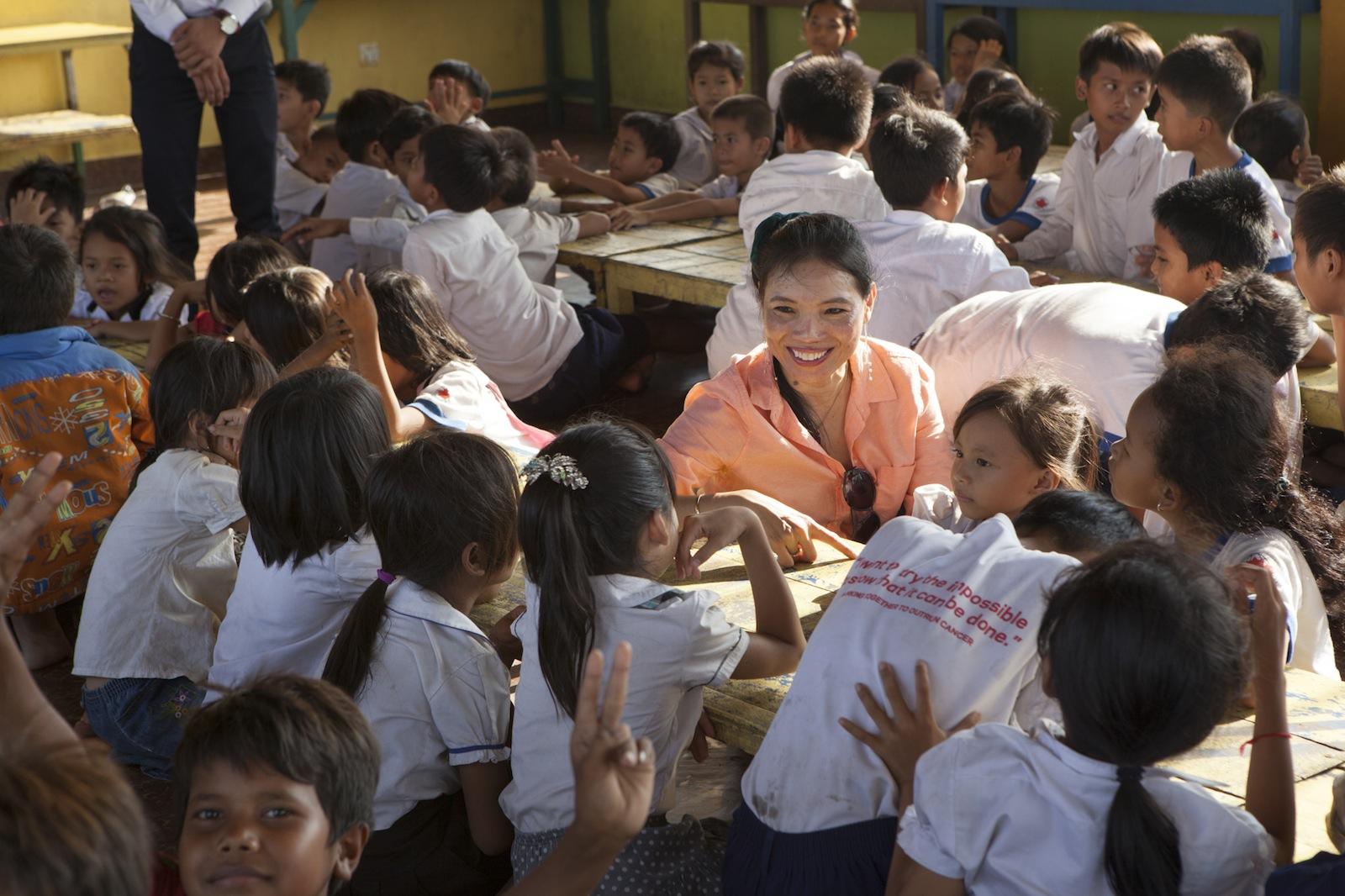
Mother has to lie
Once they have walked for many days, they are allowed to stop at a large farm. They are given black clothes and shoes made from car tyres. That is the uniform that the Khmer Rouge want everyone to wear. The Khmer Rouge is the name of the armed group that has taken over in Cambodia. Phymean’s mother is very watchful. She has heard that they don’t like people who have an education. Phymean’s mother is not just well educated, she has been to university in France. Nobody must find out.
That’s why Phymean’s mother lies. She says that she can’t read, and that she grew up on a farm. She jokes with the soldiers, saying that she can fix their clothes.
So the soldiers believe her. Many of the black-clothed soldiers with huge weapons are only ten or twelve years old. They like Phymean’s mother and when she pleads with them not to send Phymean and her big sister Hengleap to the camp where children live without their parents, they allow them to stay.
All relatives killed
Phymean is almost always hungry. The only time she feels full for a short time is when her mother catches a fish in the river and cooks it on a secret fire under one of the beds in the middle of the night. There is so much that is dangerous. Asking questions, making mistakes, going to the wrong place, being hungry or being tired.
One day, her mother looks grey and her eyes look blank. She has just found out that all of her eleven siblings, who were doctors, lawyers, police officers and teachers, are dead. Their whole families have been killed by the Khmer Rouge.
Death penalty
Phymean turns six, but she can’t start school. The Khmer Rouge have banned all schools and all books. Phymean’s job is pumping water, and her father is worried that the work exhausts her. He takes the motor from the motorized bicycle that they brought from their town, and converts it into a pump. It provides water for the whole farm, and everyone admires Phymean’s father for being such a skilled mechanic.
But one of the village leaders is jealous. He doesn’t like the admiration that Phymean’s father is getting, or the fact that his family hasn’t been split up. He goes to the highest leader and tells him that Phymean’s father has killed and eaten a chicken. This is a serious crime when there is such a shortage of food.
The soldiers drag Phymean’s father from the house. One glance at her mother’s wild-eyed look tells Phymean that this is really big trouble. The soldiers torture her father until he confesses to eating the chicken, even though this is a lie.
The punishment for this crime is death. Not only for Phymean’s father, but for her mother, her big sister, and Phymean herself.
The soldiers do not kill them. But the fear remains, and it is stronger than ever.
Arrival of the Vietnamese
One day, when Phymean is eight years old, she hears bombs in the distance. The Vietnamese are coming.
“Hurry!” says her mother, pushing them towards a corner of the garden.
There is an underground room there, with food and blankets. Phymean has never seen it before. Her mother dug it in secret and wove a bamboo door to make it invisible among the greenery of the garden. They sleep in the underground room for a week.
When the Vietnamese soldiers come, Phymean’s father emerges. He speaks Vietnamese. He becomes the Vietnamese army’s translator, and the whole family get a lift in a tank back to their hometown.
As they depart, Phymean throws her head back and shouts, “We have a car! We’re going home!”
School, finally
At the age of nine, Phymean finally gets to start school. She wants to read every book in the whole world, and she quickly moves up from Year 2 to Year 4 to Year 7.
The Vietnamese leaders appoint Phymean’s father as Mayor of the province, but her mother doesn’t think he should be following their orders. The killing continues – but now he’s the one in charge.
“You have to put a stop to this. I can’t live with a man who sends his fellow humans to their deaths,” her mother says.
But her father doesn’t want to leave his job. Instead, he leaves the family.
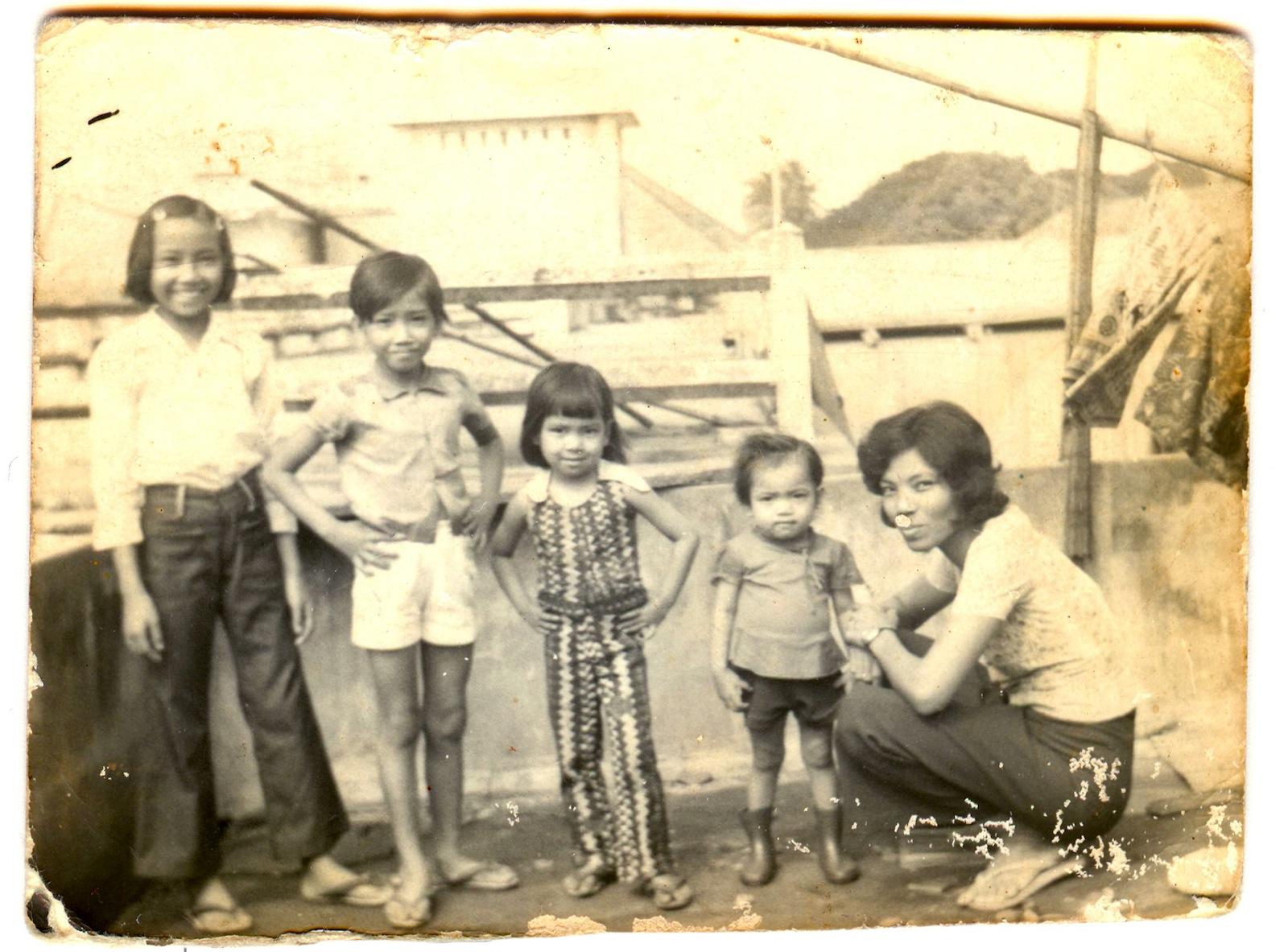
Mother falls ill
They manage fine. They have a motorbike, a sewing machine, two bikes, a house and furniture. But when Phymean turns thirteen, everything changes again. Her sister Hengleap runs away to Thailand leaving a newborn daughter, Malyda, who wouldn’t have survived the dangerous journey through the jungle.
Soon after that, Phymean’s mother falls seriously ill. Although many years have passed, there are still no doctors in Cambodia. The Khmer Rouge killed all the doctors, as well as the teachers who could have trained new doctors.
Phymean has to work hard to take care of her mother and her baby niece. One by one, she sells their belongings.
“You have to go to school,” says her mother in a weak voice.
But Phymean doesn’t want to leave her, not even for school, which she loves.
“Yes,” says her mother, “you have to get an education. Knowledge is the key to a better life. Money and things – people can take those away from you. But nobody can steal your knowledge.”
Every evening, Phymean holds her mother tight. One evening, her mother whispers:
“Hold on tight to your dreams, Phymean. You are capable of achieving whatever you set out to do.”
Then her mother dies.
Alone with a niece
Now Phymean is alone in the world. She has been through many terrible experiences, but never in her life has she been so afraid. All Phymean has left is the four walls of her house, and a bike. Every morning before dawn she gathers water from the garden and fills a tank. When it’s full, she sells the water as drinking water.
Phymean gets a job as a secretary. She doesn’t earn much, but she is allowed to bring her two-year-old niece to work, where she sits under the desk all day.
After work Phymean cycles to an evening school and when school is finished she cycles home in darkness. When they get home, Phymean cooks rice and puts her niece to bed. Then she begins her third job – copying story books by hand, word for word. There are no photocopiers, and there is a publisher that really likes Phymean’s neat handwriting. She works until late at night.
Phymean struggles for many years. She manages to get an education and she finds her sister again, so her niece gets her mother back.
Phymean gets a job working for the UN, and helps with the first free elections in Cambodia. She moves to the capital city Phnom Penh, works in an office, buys a car and has money in the bank. Suddenly, life is straightforward.
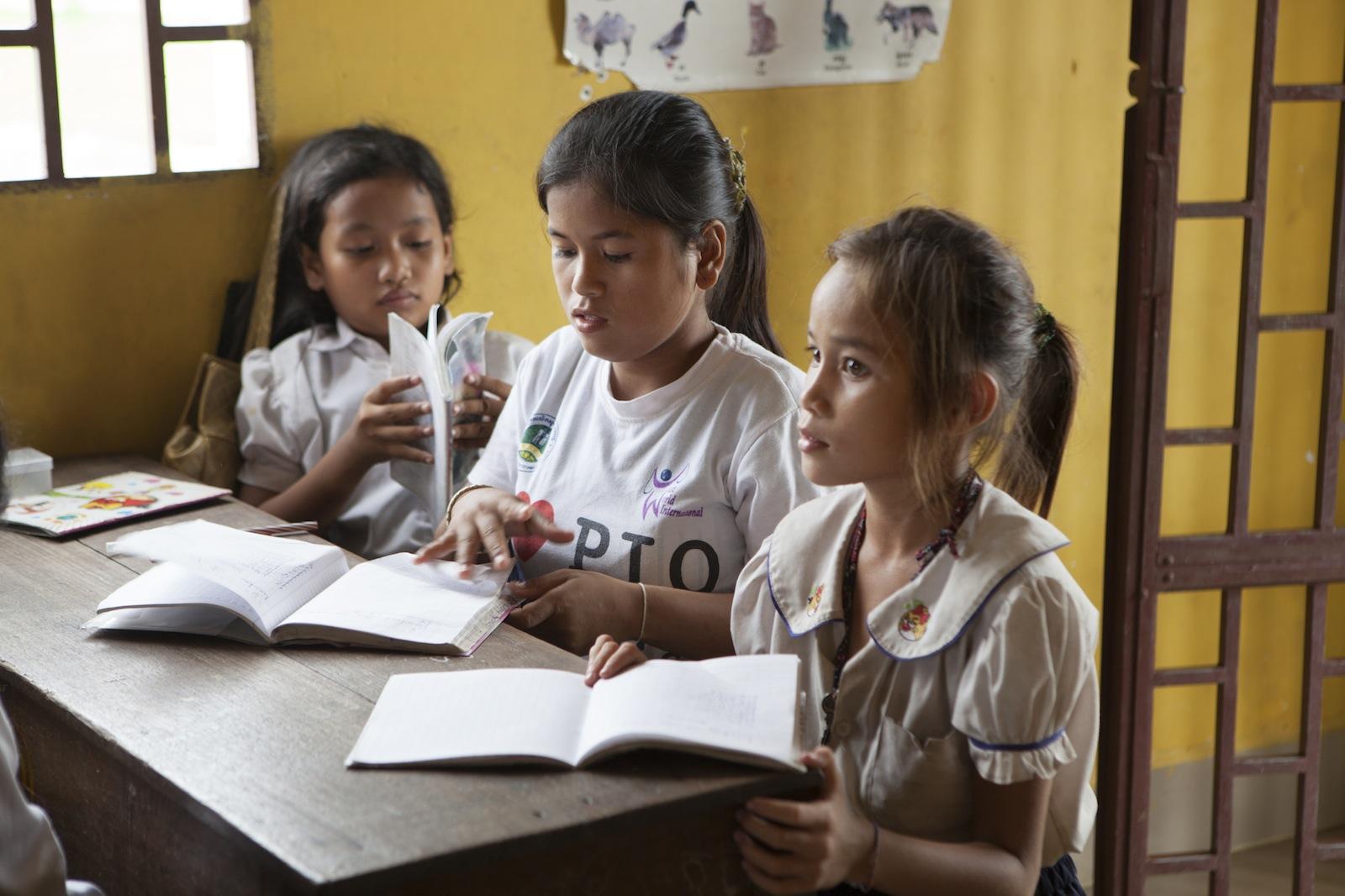
Fighting for chicken legs
One day Phymean is eating a grilled chicken for lunch on the banks of the Mekong River. She throws her chicken legs on a trash pile, and suddenly five children appear. They fight and claw at one another to get to the remains of the chicken. Phymean is appalled.
“Stop, stop!” she shouts. “Stop it! I’ll buy a new chicken for you, come and sit down.”
As they eat, the children tell her that they have come from a rural area, because their parents were looking for work. But the only jobs are as waste pickers on the garbage dump, where they live too. They explain how they fight for survival every single day.”
“How can I help you?” asks Phymean.
“I just want to go to school,” says one of the boys.
When Phymean leaves the children, she can’t get peace of mind. She thinks about the children on the garbage dump. They are fighting, with no help, just like she did.
She thinks about the children on the garbage dump. They are fighting, with no help, just like she did.
The next day Phymean goes to Phnom Penh’s largest garbage dump, which is as high as a mountain. She meets children and parents, sees the canvas roofs they live under, sees the garbage trucks that plough on regardless of children in their way. She sees open wounds that never heal. The stench is everywhere. It’s like coming into hell itself, thinks Phymean.
She quits her job, takes out all her money from the bank, and sets up her work at the garbage dump. Most of the children are desperate to go to school, but the parents are unsure. The children have to help provide for their families, otherwise the families will starve.
On the first day, 25 children come to Phymean’s school. Then more and more. Phymean connects the first tap bringing clean water to the garbage dump. They need food and teachers too.
Phymean is at the garbage dump every day. She is their teacher, leader, janitor, counsellor – she is everything to the children. Slowly, the school becomes established. More children and more teachers come, and after a couple of years, Phymean opens another school.
Never give up!
Thirteen years have passed since Phymean started her organisation. There are now three schools and a children’s home for orphaned or abandoned children. The organisation also helps families and communities around the garbage dump.
“Never give up! That’s how I think, and that’s what I say to the children at school. The children here have a tough life. There are gangs, drugs, and much danger. But we help the children to visualise their dreams and fight to achieve them. If I managed it, then so can they. And we are capable of achieving everything we set out to do!”
Related stories
Långgatan 13, 647 30, Mariefred, Sweden
Phone: +46-159-129 00 • info@worldschildrensprize.org
© 2020 World’s Children’s Prize Foundation. All rights reserved. WORLD'S CHILDREN'S PRIZE®, the Foundation's logo, WORLD'S CHILDREN'S PRIZE FOR THE RIGHTS OF THE CHILD®, WORLD'S CHILDREN'S PARLIAMENT®, WORLD'S CHILDREN'S OMBUDSMAN®, WORLD'S CHILDREN'S PRESS CONFERENCE® and YOU ME EQUAL RIGHTS are service marks of the Foundation.



